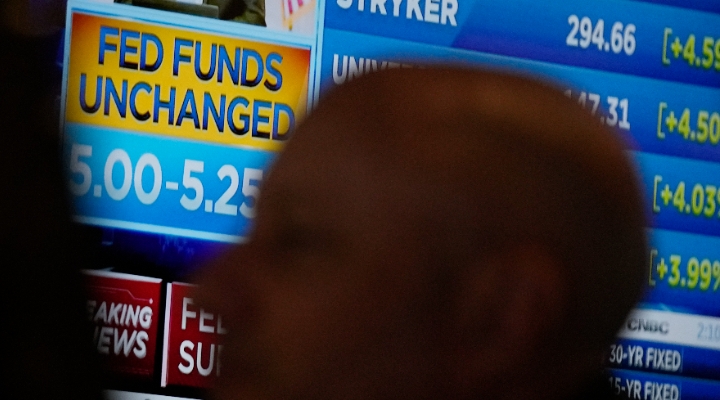.jpg)
The Bank of England (BoE) has unleashed a bumper 50 basis points interest rate hike on the economy in a dramatic "bazooka" bid to contain inflation.
This afternoon the UK's central bank's Monetary Policy Committee (MPC) voted to increase rates for a 13th consecutive time to 5%, signalling a doubling down on monetary policy orthodoxy amid rising concern about its ability to control stubbornly high consumer price index (CPI) and core inflation. UK inflation figures for May showed CPI unchanged at 8.7% on Wednesday, piling further pressure on the Bank to take action.
The MPC vote breakdown, meanwhile, suggests no committee member wanted the 25 basis point rate hike markets had actually anticipated.
"At its meeting ending on 21 June 2023, the MPC voted by a majority of 7–2 to increase Bank Rate by 0.5 percentage points, to 5%. Two members preferred to maintain Bank Rate at 4.5%," the BoE said in a statement.
"At the time of the previous MPC meeting and May Monetary Policy Report, the market-implied path for bank rate averaged just over 4% over the next three years.
"Since then, gilt yields have risen materially, particularly at shorter maturities, now suggesting a path for bank rate that averages around 5.5%. Mortgage rates have also risen notably. The sterling effective exchange rate has appreciated further."
As commentators digest the news, it's clear many believe the move is a step-change in the Bank's approach, even if it is sticking with the monetary orthodoxy of using rate hikes to dampen demand – and thus price rises – in the real economy.
Jonny Black, chief commercial and strategy officer at Abrdn, the listed insurance and fund management group, said the rate hike "underlined how exceptional economic conditions in the UK currently are".
"Clients have been living with high inflation and sustained rate rises for some time now, and many will be acutely aware that fears of a recession could intensify if the situation doesn’t improve soon," he said.
Chris Beauchamp, chief market analyst at trading platform IG Group, now believes the tone has been set for similar rate hikes in future.
"The BoE has come down on the side of a 50bps hike, in a move that seems to set the tone for the next few meetings," he said.
"The fight against inflation clearly has to step up a gear, and the task now for the BoE is to get ahead of the curve once again. A nod to 'persistent inflation' should put everyone on notice that Bailey and co. have overcome their reticence about more aggressive hiking."
For its part, the Committee played down the potential effect on mortgage holders.
"The Committee is continuing to monitor closely the impact of the significant increases in Bank Rate so far. As set out in the May Report, the greater share of fixed-rate mortgages means that the full impact of the increase in Bank Rate to date will not be felt for some time," it said.
Quite apart from underlining the UK's perilous economic position, today's news also illuminates once more the very different trajectory experienced by the UK versus the United States, whose recent monetary policy signals have implied a willingness to pause rate hikes.
While the Bank retains the full support of the UK government, investors could be forgiven for asking why the partnership of fiscal and monetary policy has not achieved the same outcomes as it has stateside.
"The Bank of England, which has done an outstanding job since its independence, now has my wholehearted support in its mission to defeat inflation and I today confirm we will not change its remit," chancellor Jeremy Hunt said at the Autumn Statement in 2022.
However, there are now signs the government is losing patience with the BoE, as it too attempts to meet its own target: namely, halving inflation by the end of the year.
Whatever the precise outcome, it now looks very unlikely that will happen without some form of recession.





























